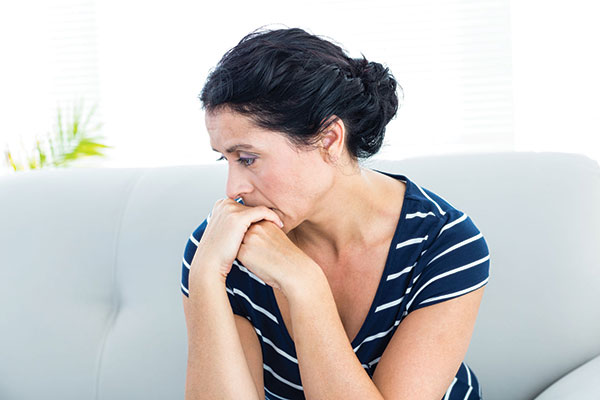Feeling Anxious? Depressed?
You’re not alone. Mood and anxiety disorders are common among cancer survivors.
by Isabel Schuermeyer, MD
A cancer diagnosis is a life-changing event – one that can seriously affect your mental well-being. Anxiety, depression, and other mood disorders are common among cancer survivors, even among those who have never experienced these kinds of mental health issues before. People without strong social support systems have a higher risk of developing mood and anxiety disorders after being diagnosed with cancer.
But before we can tackle these issues, we must first learn what they are.
♦ Depression
After a cancer diagnosis, people may say to you, “Of course you’re depressed. You’ve just been diagnosed with cancer.” That’s because many people use the term “depression” to describe feelings of sadness.
However, feeling sad (which is common and normal after a cancer diagnosis) is not the same as experiencing depression. Major depression is a medical condition that needs medical attention and treatment, whereas sadness is a temporary emotion that subsides on its own.
Major depression not only affects your quality of life, but it can also affect your ability to tolerate pain. It can even make it difficult for some survivors to stay with their course of cancer treatment. Getting treatment for depression, however, results in improved quality of life, less pain, and less time in the hospital.
The symptoms of major depression include depressed mood, decreased interest in activities you previously enjoyed, poor concentration, low self-esteem, feelings of hopelessness, and changes in sleep or appetite. While everyone feels down from time to time, in order for major depression to be diagnosed, your symptoms must last at least two weeks. During regular visits, your oncologist may ask you questions about the symptoms listed above to screen for depression. If you are showing signs of depression, your doctor can refer you to a mental health professional.
♦ Mania
Very rarely, a person will develop mania during the course of cancer. When this happens, it is often a side effect of steroids given as part of the cancer treatment.
Mania can be thought of as the opposite of depression. When this mood disorder develops, a person may experience decreased need for sleep, impulsive behavior, rapid speech, and increased activity. Mania is treated with medicines that stabilize mood. Depending on the severity of the mania, admission to a hospital or mental health facility for psychiatric treatment may be necessary. People with mania often require a psychiatric evaluation.
♦ Anxiety
Anxiety is prevalent among cancer survivors. Some people will have a specific phobia, which is a type of anxiety disorder. For example, a needle phobia or claustrophobia (fear of closed spaces, such as an MRI). Some people may even experience anticipatory anxiety, meaning they experience anxiety in anticipation of encountering something that has caused anxiety in the past. Anticipatory anxiety can occur prior to doctors’ appointments and scans. In severe cases, a person can begin to experience anxiety months prior to appointments.
Generalized anxiety disorder is marked by overwhelming and persistent worries, poor concentration, irritability, restlessness, and sleep disturbances. Other anxiety disorders cancer survivors may experience include post-traumatic stress disorder and panic disorder.
COPING STRATEGIES
Typically, coping strategies that have worked for you in the past will work again to help you during this stressful time. It is best to pick healthy coping mechanisms, such as humor, exercise, spending time with friends, meditation, or mindfulness. Turning to illicit drugs or alcohol is an unhealthy coping technique that you should avoid. Many people find support groups helpful. Most cancer centers offer these types of groups, but you can also find them online or through local community organizations.
TREATMENT
The two main types of treatment for major depression and anxiety disorders are antidepressant medications and psychotherapy (or talk therapy).
♦ Antidepressants are medications that are taken daily. They often require a few weeks before reaching their full effect. Many antidepressants are safe to use with chemotherapy, and most have few side effects. However, all medicines have the potential for side effects, so it’s important to talk with your doctor prior to taking any new medications.
♦ Psychotherapy can alleviate depression and anxiety by helping you develop new approaches to managing your symptoms and coping with general life problems. Psychotherapy can have long-term benefits, lasting even after completing the therapy.
Many resources are available to help you cope with your emotions after a cancer diagnosis. However, if you develop symptoms of a mood or anxiety disorder, you should seek out proper treatment from a mental health professional. With the right treatment, mood and anxiety disorders can be overcome, and you can live well with cancer.

Dr. Isabel Schuermeyer is immediate past-president of the American Psychosocial Oncology Society and a member of the psycho-oncology department at the Cleveland Clinic in Cleveland, OH.
This article was published in Coping® with Cancer magazine, May/June 2017.


